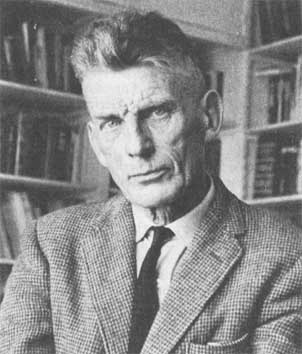


|
Publication details of Waiting for Godot: |
First written in French (En attendant Godot) in 1952. It premiered on 5th of January, 1952 at the Theatre de Babylone. |
|
Other literary works include: |
Dream of Fair to Middling Women (1932) |
A BRIEF BIOGRAPHY ...
|
Born: |
13th of April 1906 in Foxrock, Ireland. |
|
Early years: |
Beckett was the second of two sons of a middle class Protestant couple. |
|
Schooling: |
He studied at Earlsfort House School in Dublin, and then at Portora Royal School in Enniskillen (where Oscar Wilde had studied), where he first began to learn French. At the age of 17, he entered Trinity College, where he received his bachelor's degree. |
|
Career: |
After a brief spell of teaching in Belfast, he became reader in English at the Ecole Normale Superieure in Paris in 1928. He returned to Ireland in 1930 to take up a post as a lecturer in French in Trinity College, but resigned only a few months later. In 1937 he moved to Paris permanently. Throughout the 1930s and early 1940s Beckett worked as a reviewer and translator for various magazines and projects (periodicals??), including Nancy Cumard's Negro Anthology (1934). In October 1940, he became a member of the French Resistance and was forced to flee to unoccupied France in August 1942. France rewarded his courage in 1945 with the Crois de Guerre and the Medaille de la Resistance. During World War II he worked on a farm in Roussillion, where he had taken refuge. His most prolific output was made between 1947and 1950. |
|
Final years: |
The 1970s were less prolific for Beckett, but he managed to write some new plays for the BBC, and continued to interest himself in productions of his theatrical works. In the early 1980s he crafted more prose pieces and plays (notably Rockaby and Ohio Impromptu). His last major prose fiction, Stirring Still, was written in 1986. However, in the same year Beckett began to suffer from the onset of emphysema. He wrote his final work, the poem What is the World, in bed. Beckett was awarded the Nobel Prize for Literature in 1969. |
|
Died: |
He died on 22nd December, 1989, and is buried in Montparnasse Cemetary in Paris. |
|
Beckett-related web-sites: |